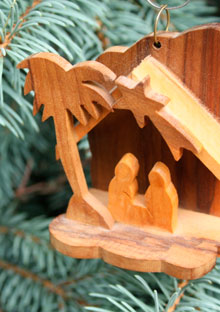
© 2008 Jupiterimages Corporation
Buffeted by change and unexpected sorrow, Catherine Newman finds comfort in a $3.99 crèche.
It's naptime in the manger. The rosy porcelain baby is sleeping quietly beside his mother, who dozes on her back on the barn floor, despite her permanent bent-kneed posture and a broken-off right hand. There's not a soul awake in the stable: An ox snores softly between two kings; the shepherd lies down with the lamb; a camel slumbers beneath his ceramic saddle. It's like the aftermath of a weird frat party. Opium Day at the circus. "It's pretty crowded in there!" I say, and Birdy, my 4-year-old daughter, puts her finger to her lips and gently shushes me. "I love this crush," she whispers for the zillionth time, and for the zillionth time I whisper back,"I know."A day earlier, the cashier at the Salvation Army had wrapped each piece carefully in newspaper and said, with understated Slavic enthusiasm, "Good deal, crèche." Indeed. Ten barely chipped figures, shedding thatched stable included, for $3.99: In the thick of the holiday season, I was treating myself to a little bargain therapy. Or maybe I just wanted to watch Birdy play. We were accomplishing all our usual festive tasks—packaging homemade marshmallows for our new neighbors, frying latkes, cracking walnuts by the woodstove while Frank Sinatra crooned "Silent Night" scratchily from the record player. But the holiday warmth was like a thin sweater, and beneath it I felt cold.
We had just moved—moved in the middle of an ice storm, with frozen branches clattering to the ground around us like bones—and our new house was old and drafty. I lay on the couch under a blanket and pined a bit for our old, cozy, too-small house that was always warm. Moving is hard, and the exhaustion was normal. But what about the sadness? We'd strung up the twinkling lights straightaway, lit the candle chimes and the menorah in the echoing emptiness of new rooms. We were just across town from where we'd been a week earlier, and nothing was wrong, not really. Everything was great, in fact. Except that Birdy had one of her endless winter bouts of bronchitis, and we sat up with her in the night, pulled her into the dark of the strange bathroom to steam her in the strange shower, while she coughed and coughed. We were tired. Come morning, we pawed through boxes to look for the teaspoons, to look for the peanut butter. Come afternoon, we forgot to pick up our son from school, and when I finally rushed from the bitter cold to find him in the office, he said, near tears, "Where were you?" I don't know. Probably in the mouse-smell basement studying the baffling new fuse box.
At night I lay in my husband's arms and cried. It was the anniversary of a miscarriage we'd had the year before, and I cried for the baby we hadn't planned and had barely known about. I cried for that microscopic loss and the bigger one: Here in this new house, we would not likely become new parents again. "Birdy was born in the old house," I said, picturing our daughter with her red newborn scalp, her fig-sized fists. "Well, not actually in the house," I admitted. "But, you know, it's the house she came home to." Moving felt less like moving on up and more like moving away—away from the wooden windowsills pitted with evidence of teething, from the measuring wall with the comically low pencil marks, from babies in the house, babies on the way, babies in our future. Now I was weepy and flat-bellied in my lovely new house with my beautiful growing children. I am so glad and grateful, I am; but sometimes the orchestra plays something in swelling chords of luck and joy, and all I can hear is that one violin sawing out a thin melody of grief.
But then there was Birdy, kneeling to unwrap each piece of the crèche like the treasure that it was, lining everyone up on the coffee table with a million questions. As may be typical of agnostic half-Jews, I don't really know the whole story. "Those are the Magi," I say confidently. "The three wise men who brought gifts for the baby." "Then why are there five of them?" Birdy wants to know, and I shake my head, squint at the figures. "This one might be Joseph," I say. "The baby's stepfather. And maybe that's the shepherd whose stable they're sharing? I'm not actually sure." "What presents did they bring?" Birdy asks now, and, when I answer with the mysterious "Frankincense and myrrh," she says, like the Nativity accountant she has become, "Mama, that's only two presents." Before I can respond, Birdy has already moved on. "Why are there farm animals and zoo animals?" she wants to know. "And who's the baby's real dad?"
Jesus wakes briefly, and the ox, remarkably maternal in his bovine way, gets up to cuddle him while snow drifts past our new windows, blankets our new garden beds where, surely, beneath the ice, spring bulbs are dreaming of green. But now it's back to bed for everyone: wall-to-wall kings and shepherds, cows and camels, and an exhausted mother whose happy-sad eyes never close. Birdy hums a little lullaby, kisses the tops of porcelain heads, man and beast each in turn, and peace washes over all of us. However much you might envy Mary her newborn, and whatever you believe or don't believe about Jesus Christ, there is just no getting around the beauty of this little girl tucking everyone in safely over and over again. It's all a kind of Christmas dollhouse to her, sure—but to me it's the timeless and universal idea of shelter. And so, finally, I am home.




